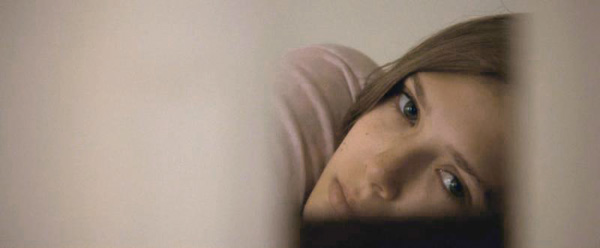
Elizabeth Olson as Martha (Photo: Jody Lee Lipes/Fox Searchlight)
Written & Directed by Sean Durkin
Produced by Josh Mond, Antonio Campos, Chris Maybach & Patrick Cunningham
Released by Fox Searchlight
USA. 101 min. Rated R
With Elizabeth Olsen, Brady Corbet, Hugh Dancy, John Hawkes & Sarah Paulson
![]() A creepy Luddite zealot, Patrick (John Hawkes), leads a small rural community in upstate New York. His scheme involves building the communal farm from scratch, while sending out his right-hand man, Watts (Brady Corbet), to recruit young people, mostly young women, from around the tri-state area to bring them back to work and, eventually, for sex. Seemingly the only one over 30 in the collective, Patrick runs a tight ship. He only allows eating during the one designated meal time, nobody may leave the complex, and only male children are to be born. For the newly indoctrinated women, some aspects of the lifestyle can be hard to swallow, but Patrick sure knows how to make a girl feel special.
A creepy Luddite zealot, Patrick (John Hawkes), leads a small rural community in upstate New York. His scheme involves building the communal farm from scratch, while sending out his right-hand man, Watts (Brady Corbet), to recruit young people, mostly young women, from around the tri-state area to bring them back to work and, eventually, for sex. Seemingly the only one over 30 in the collective, Patrick runs a tight ship. He only allows eating during the one designated meal time, nobody may leave the complex, and only male children are to be born. For the newly indoctrinated women, some aspects of the lifestyle can be hard to swallow, but Patrick sure knows how to make a girl feel special.
For all its threats of violence, a cult is most dangerous because of the subtle way it coerces. Veteran indie producer, first time writer-director, and winner of the directing award at Sundance 2011, Sean Durkin understands this point well, and takes us on an emotional ride in this quiet thriller. The process starts with Patrick making each girl feel as though she’s his favorite, complimenting her to boost her confidence, and ends with her total devotion to him, even to the point where his followers would commit mayhem on his command. I’m reminded of George Orwell’s totalitarian depiction in the end of 1984, wherein Winston learns that it’s not enough just to threaten somebody into a belief system. They must be fully convinced of it. Hearts and minds.
While Hawkes is masterful as usual, Corbet is equally brilliant here. This attractive young man, who both recruits for Patrick and enforces his rules, is intoxicating and terrifying at the same time. Watts believes in the farm, yet Corbet allows the faintest glimmer of sadism into his eyes, belying total devotion for a slightly more conscious understanding of what’s actually going on. This guy’s not brainwashed, but he’s devoted nonetheless—a key part of the power apparatus, one of the privileged on this farm.
Opposite him is Martha, or, as Patrick renames her, Marcy May, AKA Marlene, the name she is instructed to use if anyone calls on the phone. And if you think Hawkes and Corbet are good, just wait till you see Elizabeth Olsen, the talented younger sibling of the twins of tabloid fame. She is flawless whether she’s laughing or crying in this roller coaster role. Not once does she overdo it. In a film where there is always something lurking around the corner, whether it’s a malevolent stranger or even some bit of terrible news we imagine coming, Olsen never clues us in. It’s real fear every time.
Durkin and editor Zac Stuart-Pontier skillfully tell this story in two simultaneous parts. Martha’s beginnings on the farm are continually cut alongside scenes at her sister’s affluent lake house two years later, where she recovers after her escape. Interestingly, and thankfully, cinematographer Jody Lee Lipes depicts either timeline with only very subtle differences. (This is the best of thrillers—it’s all about subtleties). The two places are unique, visually, though without making too drastic a change in the lighting or film stock. Because of this very understated shift, along with the clever jumps in time within the editing structure, Martha’s two homes, past and present, somehow feel the same, and we are propelled further into her world. The farm is inviting at first, but then becomes dangerous. Likewise, staying with her older sister Lucy (Sarah Paulson), whom Martha hasn’t seen in years, and Lucy’s fiancé Ted (Hugh Dancy), seems like a good idea until its clear that Martha’s relationship with her sister is too damaged to be that quickly reconciled.
With no other family and under great psychological stress, Martha remains idle in this plush, isolated environment, feeling the loss of the farm, to which she still has strong emotional connections. When she can’t swim naked in the lake or must sleep in her bed alone, things don’t feel right to Martha, and the lingering regret about leaving turns out to be heartbreaking, but Durkin is smart to point out the irony. Her indoctrination may not have been strong enough to keep her on the farm by her own will, but it has left a mark on her. There are intense scenes of suspense in this wonderful thriller, and there is real violence, but to me, the psychology is the most terrifying.






Leave A Comment